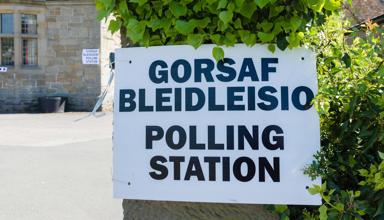The Senedd’s Finance Committee has been busy engaging with stakeholders on what they think the Welsh Government should prioritise for the 2025-26 Draft Budget. The budget is currently planned to be published on 10 December.
In this article, we take a look at what the shape of next year’s budget might be, including what a new UK Government could mean for funding available to Wales, and some of the priorities coming out of the Finance Committee’s work.
How will a new UK Government impact Welsh Government’s budget?
The day after the General Election, the First Minister talked about “a new era for the Senedd and the Welsh Government”. But it’s not yet clear what a change of government in Westminster means for the money available to the Welsh Government.
Any new funding for next year, beyond that already expected, depends on how the new UK Government chooses to implement its manifesto policy and spending pledges. However, in her first speech since becoming Chancellor, the RT Hon Rachel Reeves MP talked about “tough decisions”:
I have repeatedly warned that whoever won the general election would inherit the worst set of circumstances since the Second World War.
The new Chancellor has instructed Treasury officials to provide an assessment of the state of the UK Government’s “spending inheritance”, to be presented to Parliament before the summer recess. This would be separate to the Budget which would still be held later this year, though no specific date was given.
Manifesto pledges were analysed by the Institute for Fiscal Analysis and the National Institute of Economic and Social Research.
Wales Fiscal Analysis considered how these findings would affect the Welsh Government budget. They highlight that the Labour’s proposals going into the election, which broadly maintain current spending trajectories, could result in “significant challenges for the Welsh Government”.
Wales Fiscal Analysis estimates that, under the new UK Government, the Welsh Government’s budget for day-to-day spending would increase by an average of 1.1% per year in real terms, between 2024-25 and 2028-29. That would be 0.2 percentage points higher than previous Conservative government spending plans.
We’ve also already seen an impact of the General Election on the Welsh Government’s budget process. The timing of the election means the First Supplementary Budget for 2024-25, which we’d normally see sometime in June, has been delayed until autumn.
What do people want prioritised?
Given the potential lack of growth in the Welsh Government’s budget, prioritisation of available resources will be key.
The Finance Committee’s recent engagement is designed to give the public and stakeholders more influence on budgetary decisions at an earlier stage, to inform the Welsh Government’s spending plans before its Draft Budget is published later in the year.
The Committee’s public engagement strategy included:
- an external stakeholder event at Canolfan S4C Yr Egin in Carmarthen;
- focus groups with organisations and individuals facilitated by the Senedd’s Citizens Engagement team; and
- youth engagement events, including a focus group at Coleg y Cymoedd with students aged 16-25, and a drop-in session at the Urdd Eisteddfod.
Further drop-in sessions will be held at the Royal Welsh Show in Builth Wells and the National Eisteddfod in Pontypridd.
The stakeholder event at Canolfan S4C Yr Egin highlighted several key fiscal concerns, including:
- a general imbalance between funding front-line services and those that provide preventative services, leading to short-term reactive spending decisions by the Welsh Government;
- a lack of understanding by the Welsh Government of the impact of its spending decisions, particularly regarding cutting funding and setting budget priorities; and
- a need for Welsh Government to commit to more long-term funding settlements for local government so they can pass long-term funding on to organisations they support.
Some of the priority issues raised by participants at the stakeholder event included:
- the reliance on public services to provide support to people feeling increased pressures due to the rise in the cost of living, the potential consequences of funding pressures on these services and how they may impact NHS services;
- the unequal impact of the rise in the cost of living on women, the impact of cost rises in rural areas and the need to address structural inequalities through long-term measures and investment;
- moving away from a reactive approach towards focusing on longer-term strategic priorities, such as preventative spend;
- addressing budgetary pressures felt by those working and studying in education sectors, improving access to free school meals by raising income thresholds and addressing the increase in the cost of a school day in terms of school uniforms, visits and equipment;
- the increase in funding for the NHS, which has not been proportionately reflected in local government budgets, and the negative effect this has had on funding social care;
- relationship between the cost of living, housing and climate “crises”; investment in building low carbon, good quality housing;
- boosting local economies by targeting funding more effectively to benefit whole communities;
- the importance of supporting the Welsh language to encourage young people to live and work within their communities; and
- the cost of childcare preventing women from returning to the workplace.
The Finance Committee has previously invited Members of the Welsh Youth Parliament (WYP) to participate in a workshop to discuss Welsh Government spending priorities.
As the WYP was not in session this year, the views of young people were gathered through a dedicated Citizen Focus Group (which were incorporated into focus groups findings, below) and a drop-in session at the Urdd Eisteddfod in Meifod in May 2024.
Priorities highlighted at the drop-in session included:
- mental health support in schools, especially around exam times;
- measures to support the environment, sustainable farming and mitigate climate change;
- universal free school meals and lowering the price of school uniforms; and
- opportunities for young people to access creative arts in education.
The Citizen Engagement Team held fifteen focus groups and one interview during June 2024 with 84 participants across Wales. Findings from these sessions included:
- Health and social care was prioritised most frequently by participants, closely followed by education and then housing and homelessness.
- Transport, economy and culture were also identified by most of the groups as priorities for funding.
- Most participants preferred to see funding spent more efficiently, rather than identifying areas to receive a reduction.
- While views on taxation or borrowing differed, most participants only wanted to see an increase of income tax for those who can afford it. Any taxation of the general public was unpopular with almost every group.
What happens next with the Welsh Government’s budget?
The Welsh Government’s Draft Budget 2025-26 is set to be published on 10 December 2024. This date could change after the timing of the UK autumn budget is announced, before the end of July.
Senedd Research will publish updates on spending priorities ahead of the Draft Budget, highlight the key points once it’s published and produce an in more detail.
The Senedd will debate the Welsh Government’s spending priorities on 17 July 2024, which you can follow on SeneddTV.
Article by Božo Lugonja and Owen Holzinger, Senedd Research, Welsh Parliament






